Leadership and Management: Hilton Hotel Case Study Report
VerifiedAdded on 2023/01/18
|13
|4381
|36
Report
AI Summary
This report examines leadership and management principles within the service industry, using the Hilton Hotel as a case study. It begins by exploring classical management theories and their application, including Taylor's scientific management, bureaucratic management, human relations theory, and contingency theory, with specific examples of their use within Hilton. The report then analyzes the roles of leaders and various leadership styles, such as democratic, autocratic, supportive, and participative, and their impacts on employee motivation and talent management. Furthermore, the report reviews management styles like Management by Objectives and consultative approaches. The analysis extends to internal and external factors influencing management styles, including strengths, weaknesses, opportunities, and threats faced by Hilton. The report also assesses hard and soft skills essential for effective leadership and management, alongside future skills required in the service sector. The report provides a comprehensive overview of leadership and management strategies, offering valuable insights into the dynamics of the service industry and their practical application within a major hospitality brand.
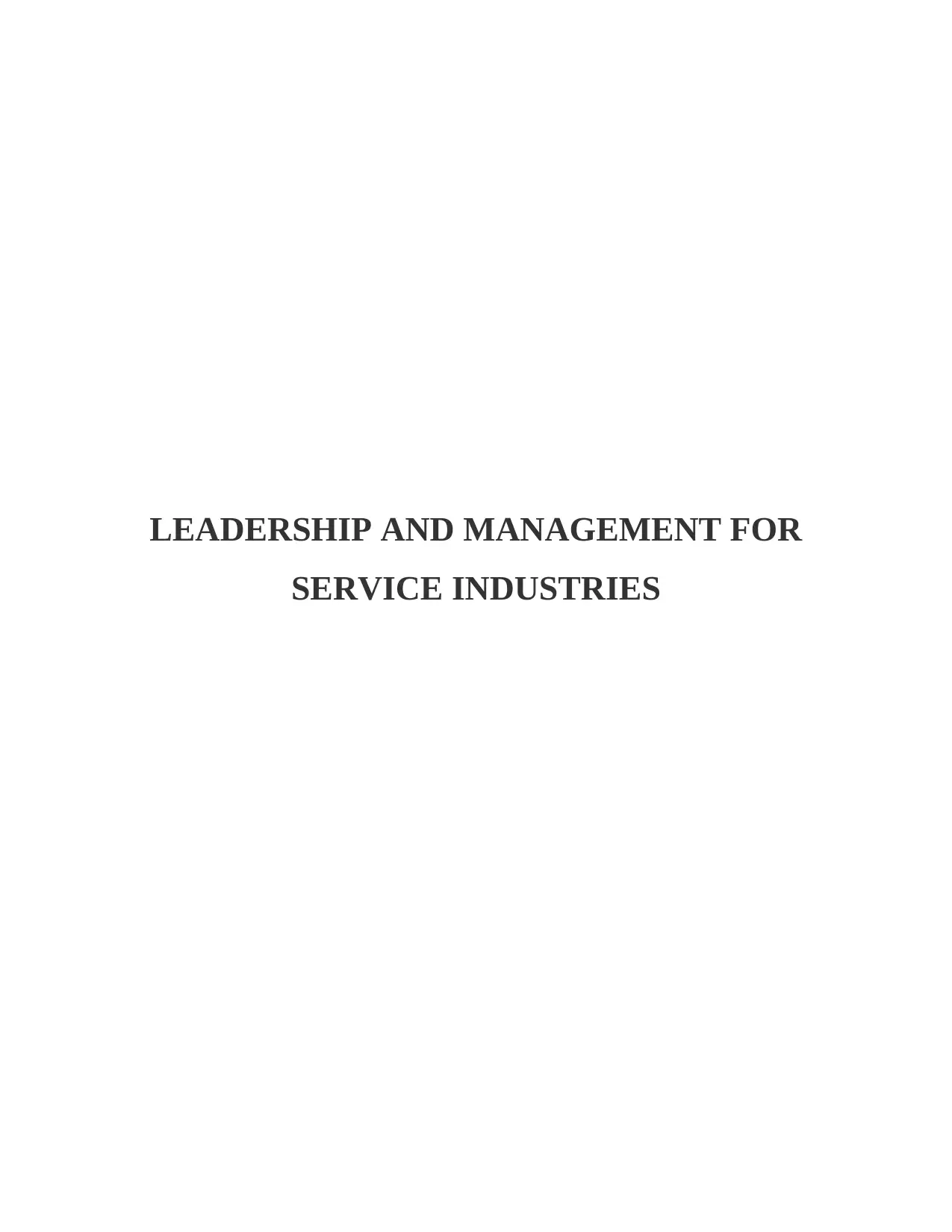
LEADERSHIP AND MANAGEMENT FOR
SERVICE INDUSTRIES
SERVICE INDUSTRIES
Paraphrase This Document
Need a fresh take? Get an instant paraphrase of this document with our AI Paraphraser
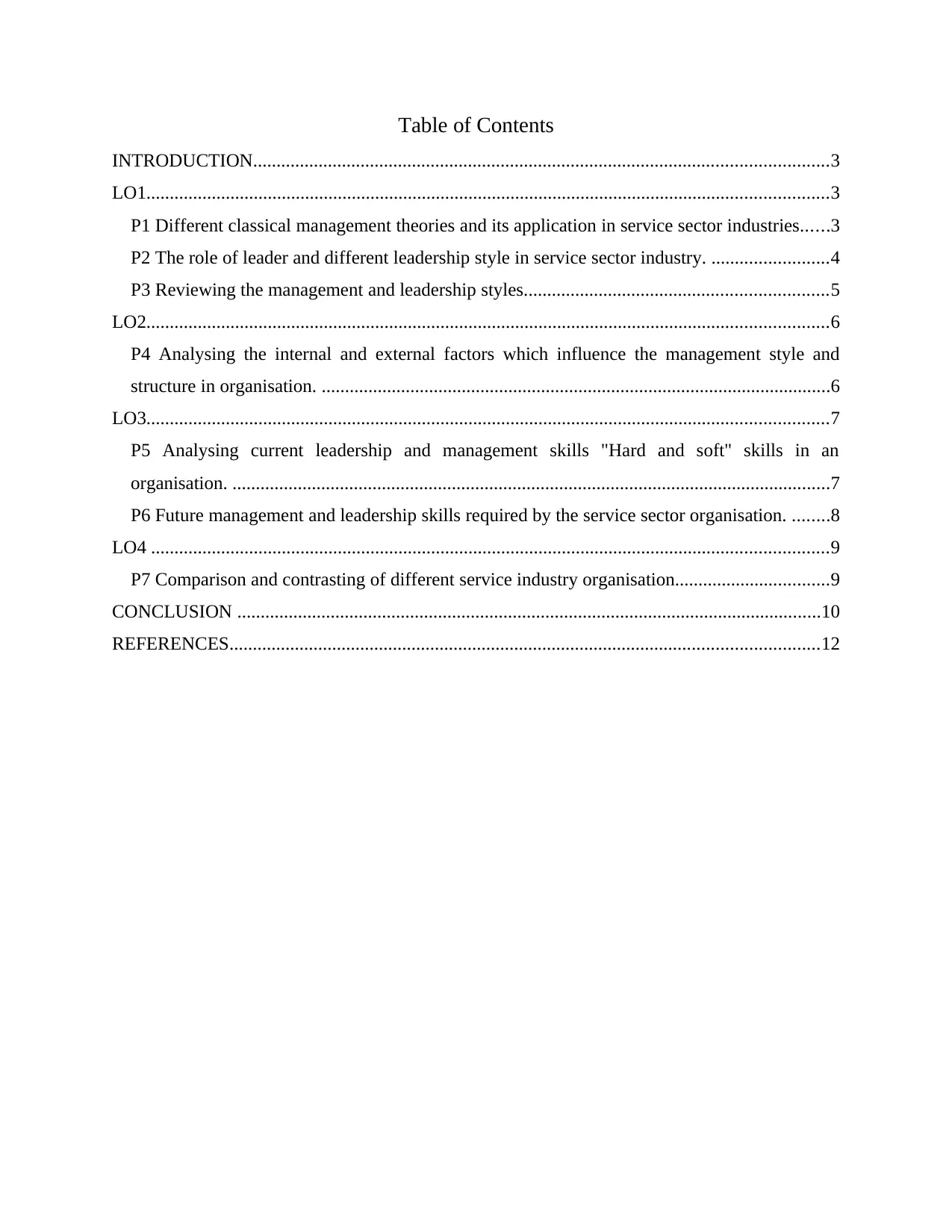
Table of Contents
INTRODUCTION...........................................................................................................................3
LO1..................................................................................................................................................3
P1 Different classical management theories and its application in service sector industries......3
P2 The role of leader and different leadership style in service sector industry. .........................4
P3 Reviewing the management and leadership styles.................................................................5
LO2..................................................................................................................................................6
P4 Analysing the internal and external factors which influence the management style and
structure in organisation. .............................................................................................................6
LO3..................................................................................................................................................7
P5 Analysing current leadership and management skills "Hard and soft" skills in an
organisation. ................................................................................................................................7
P6 Future management and leadership skills required by the service sector organisation. ........8
LO4 .................................................................................................................................................9
P7 Comparison and contrasting of different service industry organisation.................................9
CONCLUSION .............................................................................................................................10
REFERENCES..............................................................................................................................12
INTRODUCTION...........................................................................................................................3
LO1..................................................................................................................................................3
P1 Different classical management theories and its application in service sector industries......3
P2 The role of leader and different leadership style in service sector industry. .........................4
P3 Reviewing the management and leadership styles.................................................................5
LO2..................................................................................................................................................6
P4 Analysing the internal and external factors which influence the management style and
structure in organisation. .............................................................................................................6
LO3..................................................................................................................................................7
P5 Analysing current leadership and management skills "Hard and soft" skills in an
organisation. ................................................................................................................................7
P6 Future management and leadership skills required by the service sector organisation. ........8
LO4 .................................................................................................................................................9
P7 Comparison and contrasting of different service industry organisation.................................9
CONCLUSION .............................................................................................................................10
REFERENCES..............................................................................................................................12
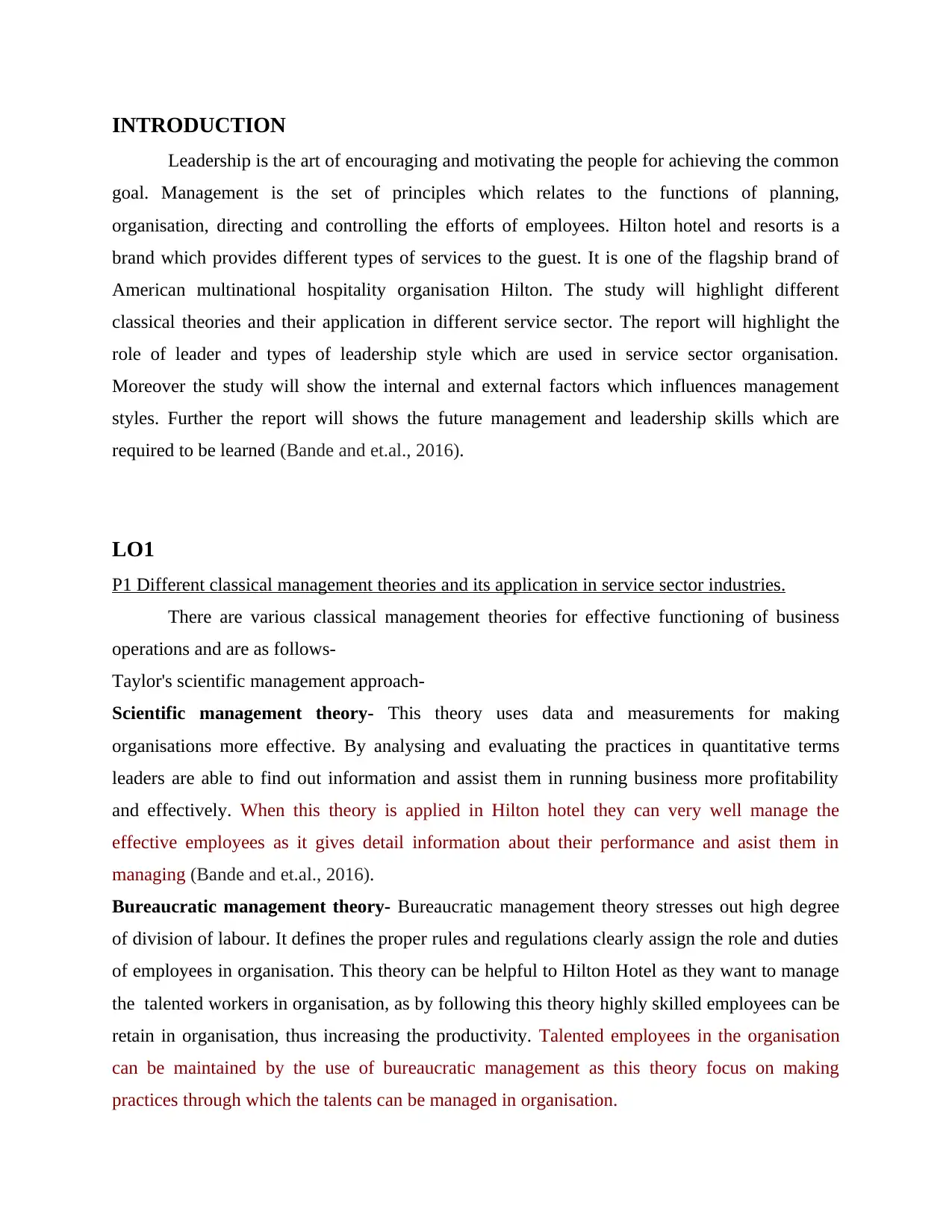
INTRODUCTION
Leadership is the art of encouraging and motivating the people for achieving the common
goal. Management is the set of principles which relates to the functions of planning,
organisation, directing and controlling the efforts of employees. Hilton hotel and resorts is a
brand which provides different types of services to the guest. It is one of the flagship brand of
American multinational hospitality organisation Hilton. The study will highlight different
classical theories and their application in different service sector. The report will highlight the
role of leader and types of leadership style which are used in service sector organisation.
Moreover the study will show the internal and external factors which influences management
styles. Further the report will shows the future management and leadership skills which are
required to be learned (Bande and et.al., 2016).
LO1
P1 Different classical management theories and its application in service sector industries.
There are various classical management theories for effective functioning of business
operations and are as follows-
Taylor's scientific management approach-
Scientific management theory- This theory uses data and measurements for making
organisations more effective. By analysing and evaluating the practices in quantitative terms
leaders are able to find out information and assist them in running business more profitability
and effectively. When this theory is applied in Hilton hotel they can very well manage the
effective employees as it gives detail information about their performance and asist them in
managing (Bande and et.al., 2016).
Bureaucratic management theory- Bureaucratic management theory stresses out high degree
of division of labour. It defines the proper rules and regulations clearly assign the role and duties
of employees in organisation. This theory can be helpful to Hilton Hotel as they want to manage
the talented workers in organisation, as by following this theory highly skilled employees can be
retain in organisation, thus increasing the productivity. Talented employees in the organisation
can be maintained by the use of bureaucratic management as this theory focus on making
practices through which the talents can be managed in organisation.
Leadership is the art of encouraging and motivating the people for achieving the common
goal. Management is the set of principles which relates to the functions of planning,
organisation, directing and controlling the efforts of employees. Hilton hotel and resorts is a
brand which provides different types of services to the guest. It is one of the flagship brand of
American multinational hospitality organisation Hilton. The study will highlight different
classical theories and their application in different service sector. The report will highlight the
role of leader and types of leadership style which are used in service sector organisation.
Moreover the study will show the internal and external factors which influences management
styles. Further the report will shows the future management and leadership skills which are
required to be learned (Bande and et.al., 2016).
LO1
P1 Different classical management theories and its application in service sector industries.
There are various classical management theories for effective functioning of business
operations and are as follows-
Taylor's scientific management approach-
Scientific management theory- This theory uses data and measurements for making
organisations more effective. By analysing and evaluating the practices in quantitative terms
leaders are able to find out information and assist them in running business more profitability
and effectively. When this theory is applied in Hilton hotel they can very well manage the
effective employees as it gives detail information about their performance and asist them in
managing (Bande and et.al., 2016).
Bureaucratic management theory- Bureaucratic management theory stresses out high degree
of division of labour. It defines the proper rules and regulations clearly assign the role and duties
of employees in organisation. This theory can be helpful to Hilton Hotel as they want to manage
the talented workers in organisation, as by following this theory highly skilled employees can be
retain in organisation, thus increasing the productivity. Talented employees in the organisation
can be maintained by the use of bureaucratic management as this theory focus on making
practices through which the talents can be managed in organisation.
⊘ This is a preview!⊘
Do you want full access?
Subscribe today to unlock all pages.

Trusted by 1+ million students worldwide
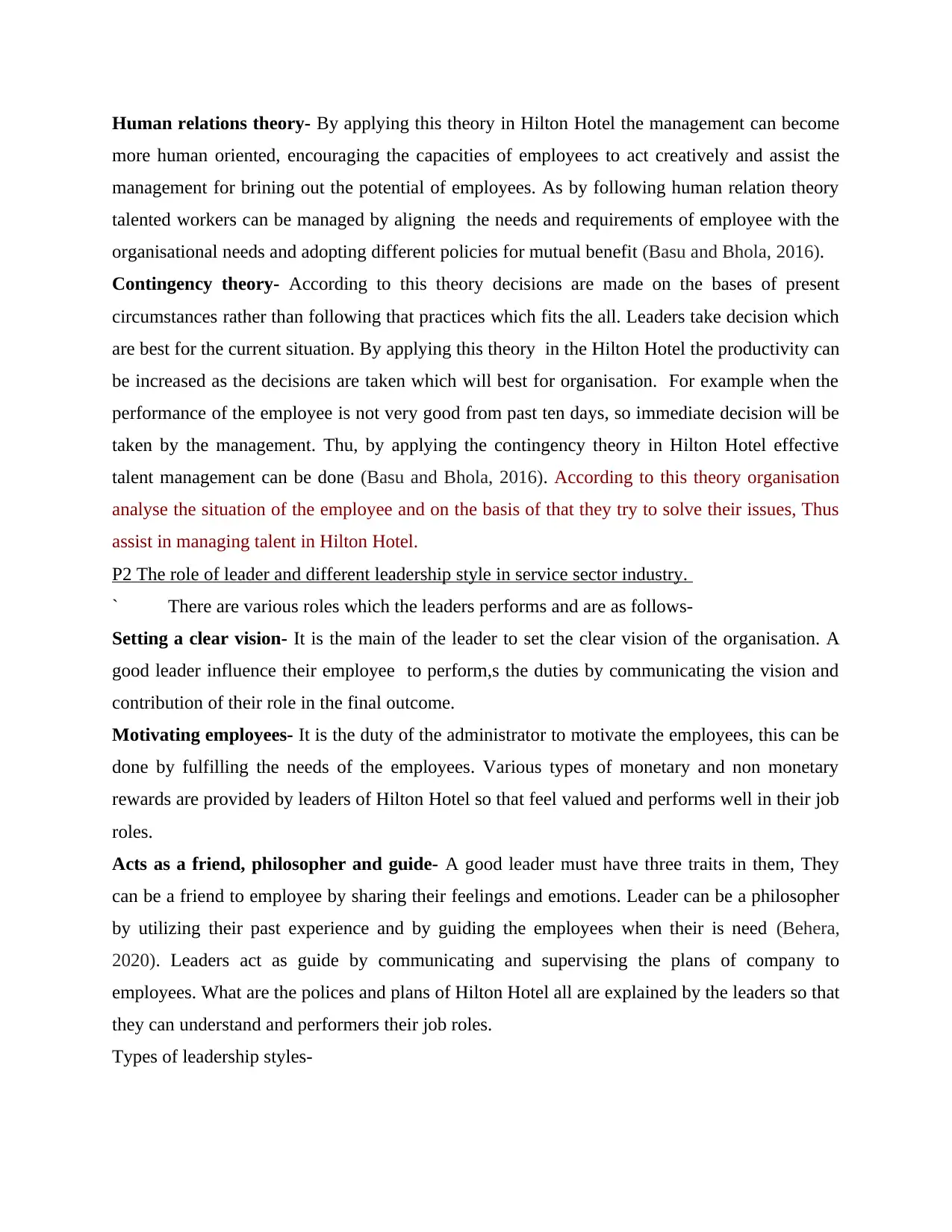
Human relations theory- By applying this theory in Hilton Hotel the management can become
more human oriented, encouraging the capacities of employees to act creatively and assist the
management for brining out the potential of employees. As by following human relation theory
talented workers can be managed by aligning the needs and requirements of employee with the
organisational needs and adopting different policies for mutual benefit (Basu and Bhola, 2016).
Contingency theory- According to this theory decisions are made on the bases of present
circumstances rather than following that practices which fits the all. Leaders take decision which
are best for the current situation. By applying this theory in the Hilton Hotel the productivity can
be increased as the decisions are taken which will best for organisation. For example when the
performance of the employee is not very good from past ten days, so immediate decision will be
taken by the management. Thu, by applying the contingency theory in Hilton Hotel effective
talent management can be done (Basu and Bhola, 2016). According to this theory organisation
analyse the situation of the employee and on the basis of that they try to solve their issues, Thus
assist in managing talent in Hilton Hotel.
P2 The role of leader and different leadership style in service sector industry.
` There are various roles which the leaders performs and are as follows-
Setting a clear vision- It is the main of the leader to set the clear vision of the organisation. A
good leader influence their employee to perform,s the duties by communicating the vision and
contribution of their role in the final outcome.
Motivating employees- It is the duty of the administrator to motivate the employees, this can be
done by fulfilling the needs of the employees. Various types of monetary and non monetary
rewards are provided by leaders of Hilton Hotel so that feel valued and performs well in their job
roles.
Acts as a friend, philosopher and guide- A good leader must have three traits in them, They
can be a friend to employee by sharing their feelings and emotions. Leader can be a philosopher
by utilizing their past experience and by guiding the employees when their is need (Behera,
2020). Leaders act as guide by communicating and supervising the plans of company to
employees. What are the polices and plans of Hilton Hotel all are explained by the leaders so that
they can understand and performers their job roles.
Types of leadership styles-
more human oriented, encouraging the capacities of employees to act creatively and assist the
management for brining out the potential of employees. As by following human relation theory
talented workers can be managed by aligning the needs and requirements of employee with the
organisational needs and adopting different policies for mutual benefit (Basu and Bhola, 2016).
Contingency theory- According to this theory decisions are made on the bases of present
circumstances rather than following that practices which fits the all. Leaders take decision which
are best for the current situation. By applying this theory in the Hilton Hotel the productivity can
be increased as the decisions are taken which will best for organisation. For example when the
performance of the employee is not very good from past ten days, so immediate decision will be
taken by the management. Thu, by applying the contingency theory in Hilton Hotel effective
talent management can be done (Basu and Bhola, 2016). According to this theory organisation
analyse the situation of the employee and on the basis of that they try to solve their issues, Thus
assist in managing talent in Hilton Hotel.
P2 The role of leader and different leadership style in service sector industry.
` There are various roles which the leaders performs and are as follows-
Setting a clear vision- It is the main of the leader to set the clear vision of the organisation. A
good leader influence their employee to perform,s the duties by communicating the vision and
contribution of their role in the final outcome.
Motivating employees- It is the duty of the administrator to motivate the employees, this can be
done by fulfilling the needs of the employees. Various types of monetary and non monetary
rewards are provided by leaders of Hilton Hotel so that feel valued and performs well in their job
roles.
Acts as a friend, philosopher and guide- A good leader must have three traits in them, They
can be a friend to employee by sharing their feelings and emotions. Leader can be a philosopher
by utilizing their past experience and by guiding the employees when their is need (Behera,
2020). Leaders act as guide by communicating and supervising the plans of company to
employees. What are the polices and plans of Hilton Hotel all are explained by the leaders so that
they can understand and performers their job roles.
Types of leadership styles-
Paraphrase This Document
Need a fresh take? Get an instant paraphrase of this document with our AI Paraphraser
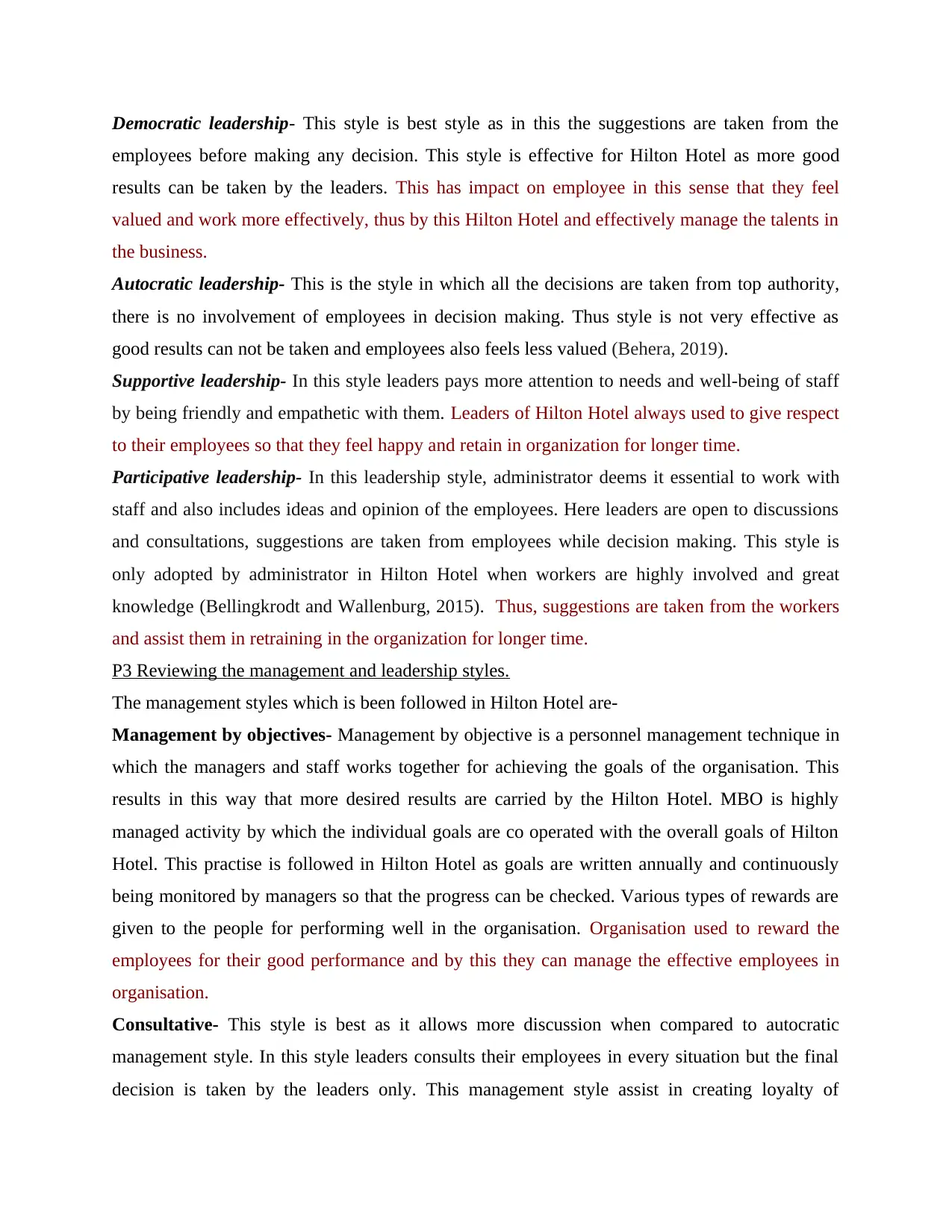
Democratic leadership- This style is best style as in this the suggestions are taken from the
employees before making any decision. This style is effective for Hilton Hotel as more good
results can be taken by the leaders. This has impact on employee in this sense that they feel
valued and work more effectively, thus by this Hilton Hotel and effectively manage the talents in
the business.
Autocratic leadership- This is the style in which all the decisions are taken from top authority,
there is no involvement of employees in decision making. Thus style is not very effective as
good results can not be taken and employees also feels less valued (Behera, 2019).
Supportive leadership- In this style leaders pays more attention to needs and well-being of staff
by being friendly and empathetic with them. Leaders of Hilton Hotel always used to give respect
to their employees so that they feel happy and retain in organization for longer time.
Participative leadership- In this leadership style, administrator deems it essential to work with
staff and also includes ideas and opinion of the employees. Here leaders are open to discussions
and consultations, suggestions are taken from employees while decision making. This style is
only adopted by administrator in Hilton Hotel when workers are highly involved and great
knowledge (Bellingkrodt and Wallenburg, 2015). Thus, suggestions are taken from the workers
and assist them in retraining in the organization for longer time.
P3 Reviewing the management and leadership styles.
The management styles which is been followed in Hilton Hotel are-
Management by objectives- Management by objective is a personnel management technique in
which the managers and staff works together for achieving the goals of the organisation. This
results in this way that more desired results are carried by the Hilton Hotel. MBO is highly
managed activity by which the individual goals are co operated with the overall goals of Hilton
Hotel. This practise is followed in Hilton Hotel as goals are written annually and continuously
being monitored by managers so that the progress can be checked. Various types of rewards are
given to the people for performing well in the organisation. Organisation used to reward the
employees for their good performance and by this they can manage the effective employees in
organisation.
Consultative- This style is best as it allows more discussion when compared to autocratic
management style. In this style leaders consults their employees in every situation but the final
decision is taken by the leaders only. This management style assist in creating loyalty of
employees before making any decision. This style is effective for Hilton Hotel as more good
results can be taken by the leaders. This has impact on employee in this sense that they feel
valued and work more effectively, thus by this Hilton Hotel and effectively manage the talents in
the business.
Autocratic leadership- This is the style in which all the decisions are taken from top authority,
there is no involvement of employees in decision making. Thus style is not very effective as
good results can not be taken and employees also feels less valued (Behera, 2019).
Supportive leadership- In this style leaders pays more attention to needs and well-being of staff
by being friendly and empathetic with them. Leaders of Hilton Hotel always used to give respect
to their employees so that they feel happy and retain in organization for longer time.
Participative leadership- In this leadership style, administrator deems it essential to work with
staff and also includes ideas and opinion of the employees. Here leaders are open to discussions
and consultations, suggestions are taken from employees while decision making. This style is
only adopted by administrator in Hilton Hotel when workers are highly involved and great
knowledge (Bellingkrodt and Wallenburg, 2015). Thus, suggestions are taken from the workers
and assist them in retraining in the organization for longer time.
P3 Reviewing the management and leadership styles.
The management styles which is been followed in Hilton Hotel are-
Management by objectives- Management by objective is a personnel management technique in
which the managers and staff works together for achieving the goals of the organisation. This
results in this way that more desired results are carried by the Hilton Hotel. MBO is highly
managed activity by which the individual goals are co operated with the overall goals of Hilton
Hotel. This practise is followed in Hilton Hotel as goals are written annually and continuously
being monitored by managers so that the progress can be checked. Various types of rewards are
given to the people for performing well in the organisation. Organisation used to reward the
employees for their good performance and by this they can manage the effective employees in
organisation.
Consultative- This style is best as it allows more discussion when compared to autocratic
management style. In this style leaders consults their employees in every situation but the final
decision is taken by the leaders only. This management style assist in creating loyalty of
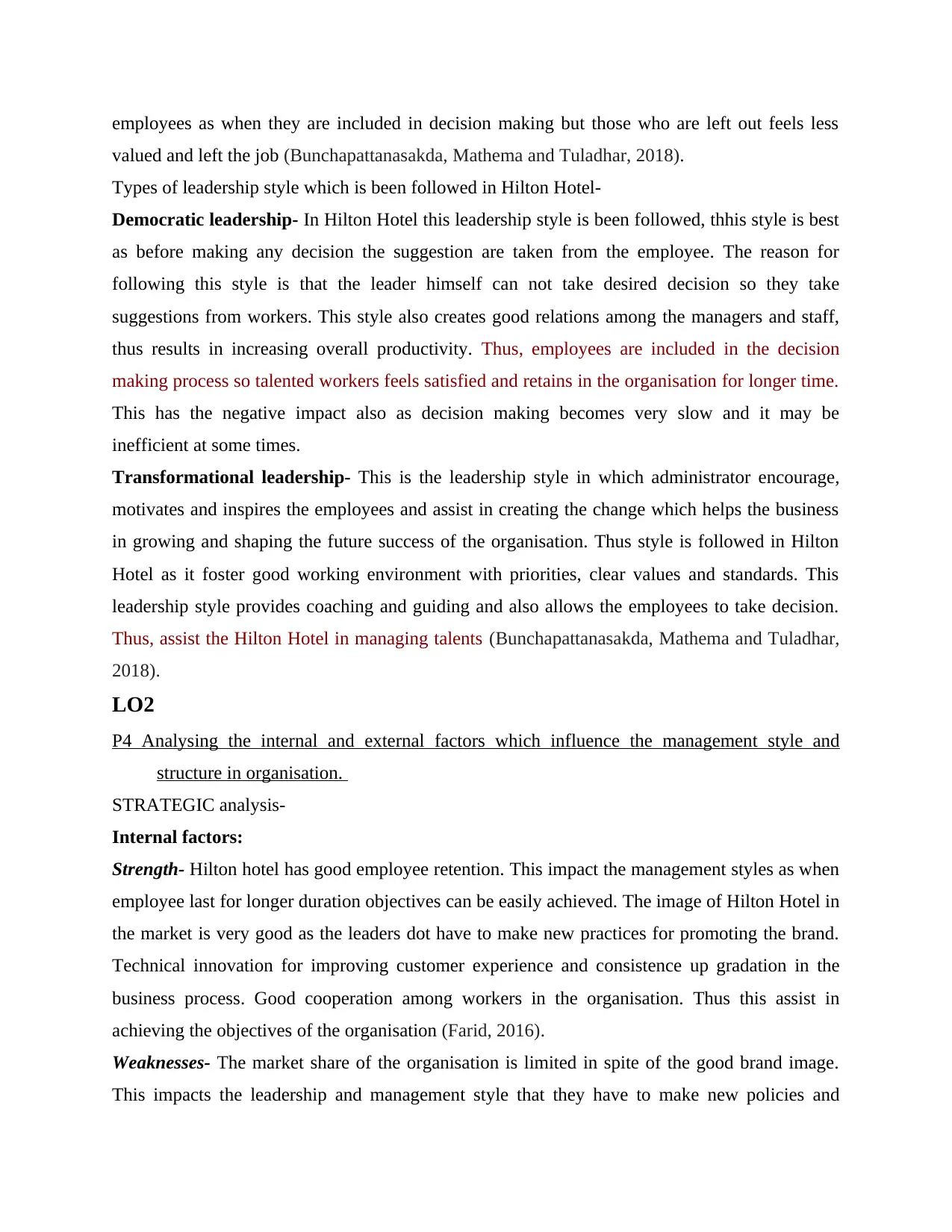
employees as when they are included in decision making but those who are left out feels less
valued and left the job (Bunchapattanasakda, Mathema and Tuladhar, 2018).
Types of leadership style which is been followed in Hilton Hotel-
Democratic leadership- In Hilton Hotel this leadership style is been followed, thhis style is best
as before making any decision the suggestion are taken from the employee. The reason for
following this style is that the leader himself can not take desired decision so they take
suggestions from workers. This style also creates good relations among the managers and staff,
thus results in increasing overall productivity. Thus, employees are included in the decision
making process so talented workers feels satisfied and retains in the organisation for longer time.
This has the negative impact also as decision making becomes very slow and it may be
inefficient at some times.
Transformational leadership- This is the leadership style in which administrator encourage,
motivates and inspires the employees and assist in creating the change which helps the business
in growing and shaping the future success of the organisation. Thus style is followed in Hilton
Hotel as it foster good working environment with priorities, clear values and standards. This
leadership style provides coaching and guiding and also allows the employees to take decision.
Thus, assist the Hilton Hotel in managing talents (Bunchapattanasakda, Mathema and Tuladhar,
2018).
LO2
P4 Analysing the internal and external factors which influence the management style and
structure in organisation.
STRATEGIC analysis-
Internal factors:
Strength- Hilton hotel has good employee retention. This impact the management styles as when
employee last for longer duration objectives can be easily achieved. The image of Hilton Hotel in
the market is very good as the leaders dot have to make new practices for promoting the brand.
Technical innovation for improving customer experience and consistence up gradation in the
business process. Good cooperation among workers in the organisation. Thus this assist in
achieving the objectives of the organisation (Farid, 2016).
Weaknesses- The market share of the organisation is limited in spite of the good brand image.
This impacts the leadership and management style that they have to make new policies and
valued and left the job (Bunchapattanasakda, Mathema and Tuladhar, 2018).
Types of leadership style which is been followed in Hilton Hotel-
Democratic leadership- In Hilton Hotel this leadership style is been followed, thhis style is best
as before making any decision the suggestion are taken from the employee. The reason for
following this style is that the leader himself can not take desired decision so they take
suggestions from workers. This style also creates good relations among the managers and staff,
thus results in increasing overall productivity. Thus, employees are included in the decision
making process so talented workers feels satisfied and retains in the organisation for longer time.
This has the negative impact also as decision making becomes very slow and it may be
inefficient at some times.
Transformational leadership- This is the leadership style in which administrator encourage,
motivates and inspires the employees and assist in creating the change which helps the business
in growing and shaping the future success of the organisation. Thus style is followed in Hilton
Hotel as it foster good working environment with priorities, clear values and standards. This
leadership style provides coaching and guiding and also allows the employees to take decision.
Thus, assist the Hilton Hotel in managing talents (Bunchapattanasakda, Mathema and Tuladhar,
2018).
LO2
P4 Analysing the internal and external factors which influence the management style and
structure in organisation.
STRATEGIC analysis-
Internal factors:
Strength- Hilton hotel has good employee retention. This impact the management styles as when
employee last for longer duration objectives can be easily achieved. The image of Hilton Hotel in
the market is very good as the leaders dot have to make new practices for promoting the brand.
Technical innovation for improving customer experience and consistence up gradation in the
business process. Good cooperation among workers in the organisation. Thus this assist in
achieving the objectives of the organisation (Farid, 2016).
Weaknesses- The market share of the organisation is limited in spite of the good brand image.
This impacts the leadership and management style that they have to make new policies and
⊘ This is a preview!⊘
Do you want full access?
Subscribe today to unlock all pages.

Trusted by 1+ million students worldwide
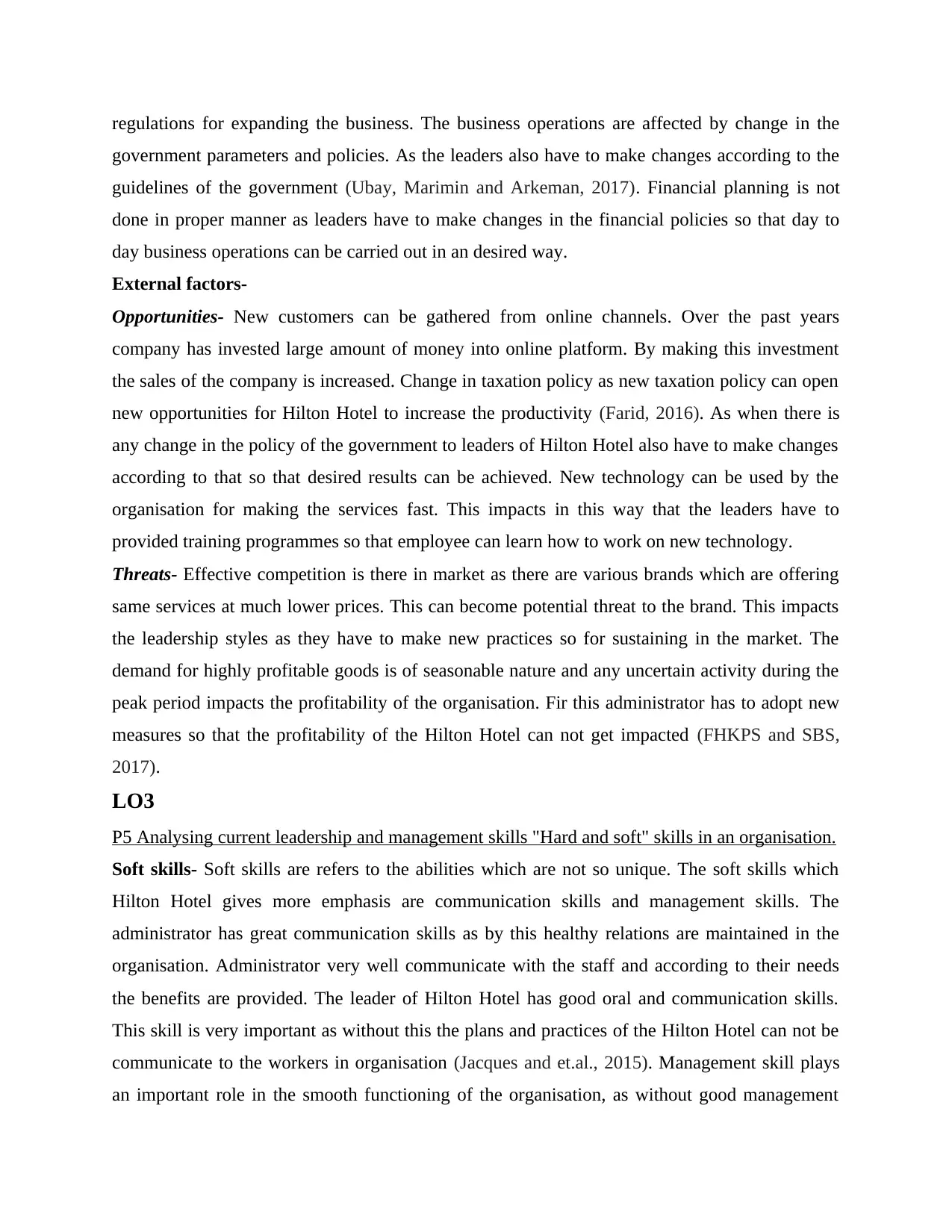
regulations for expanding the business. The business operations are affected by change in the
government parameters and policies. As the leaders also have to make changes according to the
guidelines of the government (Ubay, Marimin and Arkeman, 2017). Financial planning is not
done in proper manner as leaders have to make changes in the financial policies so that day to
day business operations can be carried out in an desired way.
External factors-
Opportunities- New customers can be gathered from online channels. Over the past years
company has invested large amount of money into online platform. By making this investment
the sales of the company is increased. Change in taxation policy as new taxation policy can open
new opportunities for Hilton Hotel to increase the productivity (Farid, 2016). As when there is
any change in the policy of the government to leaders of Hilton Hotel also have to make changes
according to that so that desired results can be achieved. New technology can be used by the
organisation for making the services fast. This impacts in this way that the leaders have to
provided training programmes so that employee can learn how to work on new technology.
Threats- Effective competition is there in market as there are various brands which are offering
same services at much lower prices. This can become potential threat to the brand. This impacts
the leadership styles as they have to make new practices so for sustaining in the market. The
demand for highly profitable goods is of seasonable nature and any uncertain activity during the
peak period impacts the profitability of the organisation. Fir this administrator has to adopt new
measures so that the profitability of the Hilton Hotel can not get impacted (FHKPS and SBS,
2017).
LO3
P5 Analysing current leadership and management skills "Hard and soft" skills in an organisation.
Soft skills- Soft skills are refers to the abilities which are not so unique. The soft skills which
Hilton Hotel gives more emphasis are communication skills and management skills. The
administrator has great communication skills as by this healthy relations are maintained in the
organisation. Administrator very well communicate with the staff and according to their needs
the benefits are provided. The leader of Hilton Hotel has good oral and communication skills.
This skill is very important as without this the plans and practices of the Hilton Hotel can not be
communicate to the workers in organisation (Jacques and et.al., 2015). Management skill plays
an important role in the smooth functioning of the organisation, as without good management
government parameters and policies. As the leaders also have to make changes according to the
guidelines of the government (Ubay, Marimin and Arkeman, 2017). Financial planning is not
done in proper manner as leaders have to make changes in the financial policies so that day to
day business operations can be carried out in an desired way.
External factors-
Opportunities- New customers can be gathered from online channels. Over the past years
company has invested large amount of money into online platform. By making this investment
the sales of the company is increased. Change in taxation policy as new taxation policy can open
new opportunities for Hilton Hotel to increase the productivity (Farid, 2016). As when there is
any change in the policy of the government to leaders of Hilton Hotel also have to make changes
according to that so that desired results can be achieved. New technology can be used by the
organisation for making the services fast. This impacts in this way that the leaders have to
provided training programmes so that employee can learn how to work on new technology.
Threats- Effective competition is there in market as there are various brands which are offering
same services at much lower prices. This can become potential threat to the brand. This impacts
the leadership styles as they have to make new practices so for sustaining in the market. The
demand for highly profitable goods is of seasonable nature and any uncertain activity during the
peak period impacts the profitability of the organisation. Fir this administrator has to adopt new
measures so that the profitability of the Hilton Hotel can not get impacted (FHKPS and SBS,
2017).
LO3
P5 Analysing current leadership and management skills "Hard and soft" skills in an organisation.
Soft skills- Soft skills are refers to the abilities which are not so unique. The soft skills which
Hilton Hotel gives more emphasis are communication skills and management skills. The
administrator has great communication skills as by this healthy relations are maintained in the
organisation. Administrator very well communicate with the staff and according to their needs
the benefits are provided. The leader of Hilton Hotel has good oral and communication skills.
This skill is very important as without this the plans and practices of the Hilton Hotel can not be
communicate to the workers in organisation (Jacques and et.al., 2015). Management skill plays
an important role in the smooth functioning of the organisation, as without good management
Paraphrase This Document
Need a fresh take? Get an instant paraphrase of this document with our AI Paraphraser
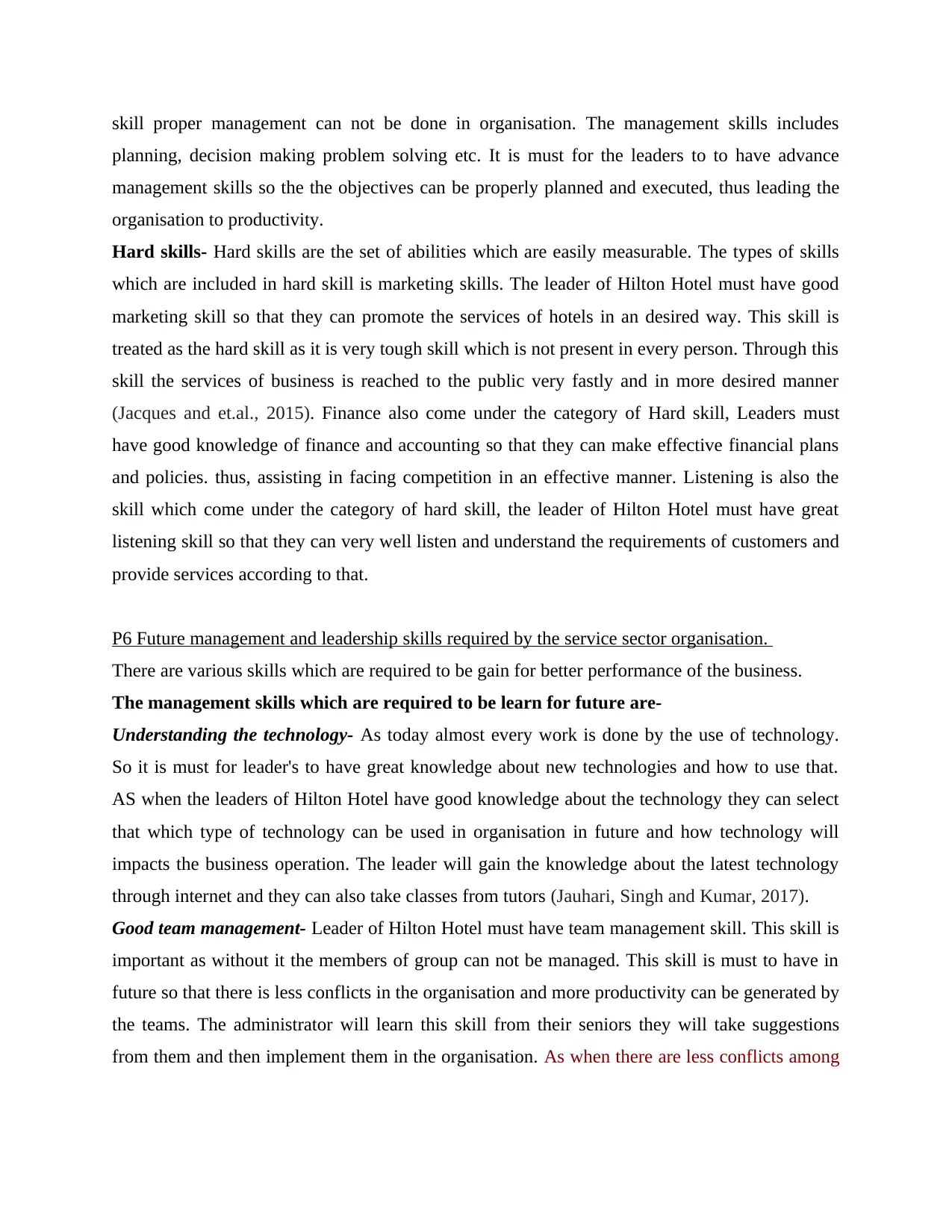
skill proper management can not be done in organisation. The management skills includes
planning, decision making problem solving etc. It is must for the leaders to to have advance
management skills so the the objectives can be properly planned and executed, thus leading the
organisation to productivity.
Hard skills- Hard skills are the set of abilities which are easily measurable. The types of skills
which are included in hard skill is marketing skills. The leader of Hilton Hotel must have good
marketing skill so that they can promote the services of hotels in an desired way. This skill is
treated as the hard skill as it is very tough skill which is not present in every person. Through this
skill the services of business is reached to the public very fastly and in more desired manner
(Jacques and et.al., 2015). Finance also come under the category of Hard skill, Leaders must
have good knowledge of finance and accounting so that they can make effective financial plans
and policies. thus, assisting in facing competition in an effective manner. Listening is also the
skill which come under the category of hard skill, the leader of Hilton Hotel must have great
listening skill so that they can very well listen and understand the requirements of customers and
provide services according to that.
P6 Future management and leadership skills required by the service sector organisation.
There are various skills which are required to be gain for better performance of the business.
The management skills which are required to be learn for future are-
Understanding the technology- As today almost every work is done by the use of technology.
So it is must for leader's to have great knowledge about new technologies and how to use that.
AS when the leaders of Hilton Hotel have good knowledge about the technology they can select
that which type of technology can be used in organisation in future and how technology will
impacts the business operation. The leader will gain the knowledge about the latest technology
through internet and they can also take classes from tutors (Jauhari, Singh and Kumar, 2017).
Good team management- Leader of Hilton Hotel must have team management skill. This skill is
important as without it the members of group can not be managed. This skill is must to have in
future so that there is less conflicts in the organisation and more productivity can be generated by
the teams. The administrator will learn this skill from their seniors they will take suggestions
from them and then implement them in the organisation. As when there are less conflicts among
planning, decision making problem solving etc. It is must for the leaders to to have advance
management skills so the the objectives can be properly planned and executed, thus leading the
organisation to productivity.
Hard skills- Hard skills are the set of abilities which are easily measurable. The types of skills
which are included in hard skill is marketing skills. The leader of Hilton Hotel must have good
marketing skill so that they can promote the services of hotels in an desired way. This skill is
treated as the hard skill as it is very tough skill which is not present in every person. Through this
skill the services of business is reached to the public very fastly and in more desired manner
(Jacques and et.al., 2015). Finance also come under the category of Hard skill, Leaders must
have good knowledge of finance and accounting so that they can make effective financial plans
and policies. thus, assisting in facing competition in an effective manner. Listening is also the
skill which come under the category of hard skill, the leader of Hilton Hotel must have great
listening skill so that they can very well listen and understand the requirements of customers and
provide services according to that.
P6 Future management and leadership skills required by the service sector organisation.
There are various skills which are required to be gain for better performance of the business.
The management skills which are required to be learn for future are-
Understanding the technology- As today almost every work is done by the use of technology.
So it is must for leader's to have great knowledge about new technologies and how to use that.
AS when the leaders of Hilton Hotel have good knowledge about the technology they can select
that which type of technology can be used in organisation in future and how technology will
impacts the business operation. The leader will gain the knowledge about the latest technology
through internet and they can also take classes from tutors (Jauhari, Singh and Kumar, 2017).
Good team management- Leader of Hilton Hotel must have team management skill. This skill is
important as without it the members of group can not be managed. This skill is must to have in
future so that there is less conflicts in the organisation and more productivity can be generated by
the teams. The administrator will learn this skill from their seniors they will take suggestions
from them and then implement them in the organisation. As when there are less conflicts among
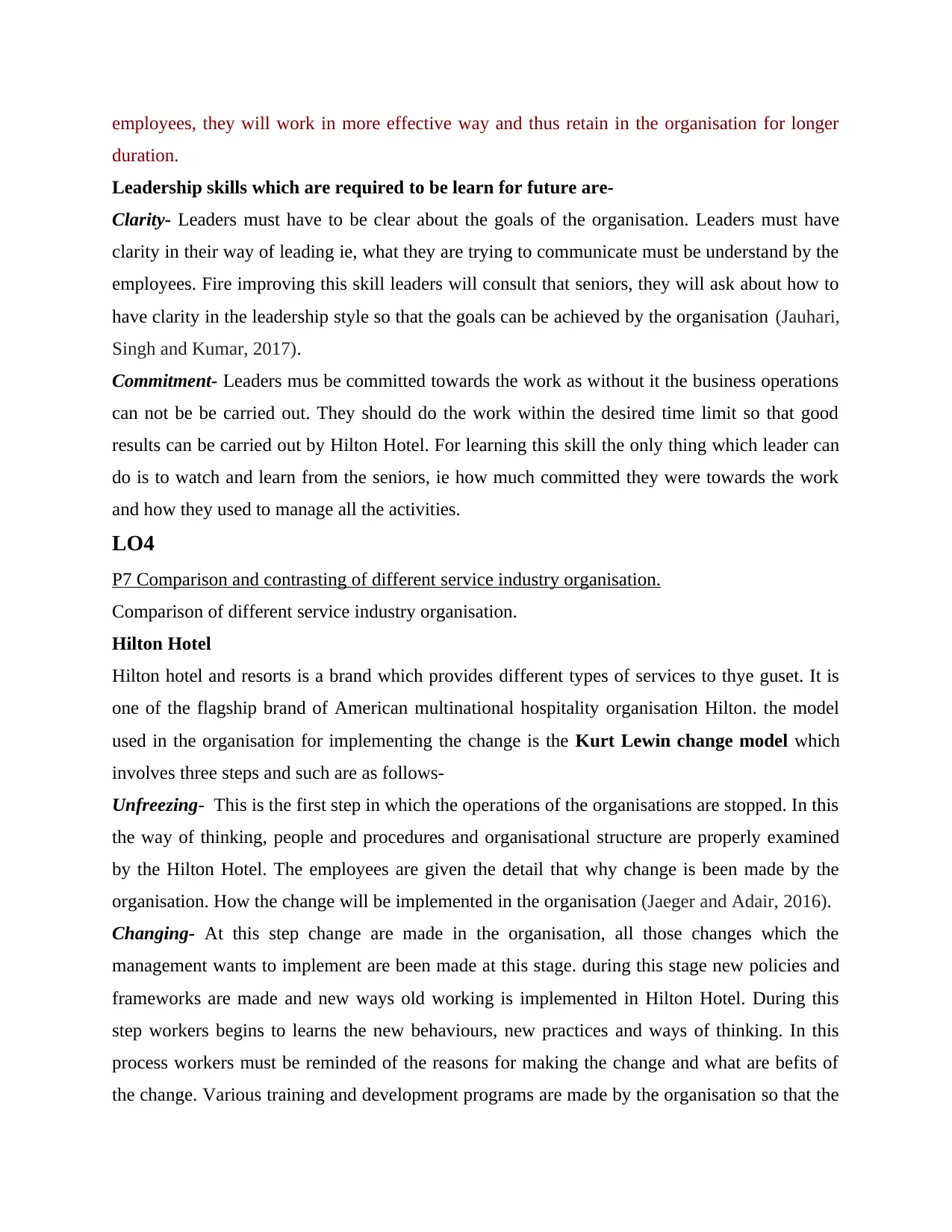
employees, they will work in more effective way and thus retain in the organisation for longer
duration.
Leadership skills which are required to be learn for future are-
Clarity- Leaders must have to be clear about the goals of the organisation. Leaders must have
clarity in their way of leading ie, what they are trying to communicate must be understand by the
employees. Fire improving this skill leaders will consult that seniors, they will ask about how to
have clarity in the leadership style so that the goals can be achieved by the organisation (Jauhari,
Singh and Kumar, 2017).
Commitment- Leaders mus be committed towards the work as without it the business operations
can not be be carried out. They should do the work within the desired time limit so that good
results can be carried out by Hilton Hotel. For learning this skill the only thing which leader can
do is to watch and learn from the seniors, ie how much committed they were towards the work
and how they used to manage all the activities.
LO4
P7 Comparison and contrasting of different service industry organisation.
Comparison of different service industry organisation.
Hilton Hotel
Hilton hotel and resorts is a brand which provides different types of services to thye guset. It is
one of the flagship brand of American multinational hospitality organisation Hilton. the model
used in the organisation for implementing the change is the Kurt Lewin change model which
involves three steps and such are as follows-
Unfreezing- This is the first step in which the operations of the organisations are stopped. In this
the way of thinking, people and procedures and organisational structure are properly examined
by the Hilton Hotel. The employees are given the detail that why change is been made by the
organisation. How the change will be implemented in the organisation (Jaeger and Adair, 2016).
Changing- At this step change are made in the organisation, all those changes which the
management wants to implement are been made at this stage. during this stage new policies and
frameworks are made and new ways old working is implemented in Hilton Hotel. During this
step workers begins to learns the new behaviours, new practices and ways of thinking. In this
process workers must be reminded of the reasons for making the change and what are befits of
the change. Various training and development programs are made by the organisation so that the
duration.
Leadership skills which are required to be learn for future are-
Clarity- Leaders must have to be clear about the goals of the organisation. Leaders must have
clarity in their way of leading ie, what they are trying to communicate must be understand by the
employees. Fire improving this skill leaders will consult that seniors, they will ask about how to
have clarity in the leadership style so that the goals can be achieved by the organisation (Jauhari,
Singh and Kumar, 2017).
Commitment- Leaders mus be committed towards the work as without it the business operations
can not be be carried out. They should do the work within the desired time limit so that good
results can be carried out by Hilton Hotel. For learning this skill the only thing which leader can
do is to watch and learn from the seniors, ie how much committed they were towards the work
and how they used to manage all the activities.
LO4
P7 Comparison and contrasting of different service industry organisation.
Comparison of different service industry organisation.
Hilton Hotel
Hilton hotel and resorts is a brand which provides different types of services to thye guset. It is
one of the flagship brand of American multinational hospitality organisation Hilton. the model
used in the organisation for implementing the change is the Kurt Lewin change model which
involves three steps and such are as follows-
Unfreezing- This is the first step in which the operations of the organisations are stopped. In this
the way of thinking, people and procedures and organisational structure are properly examined
by the Hilton Hotel. The employees are given the detail that why change is been made by the
organisation. How the change will be implemented in the organisation (Jaeger and Adair, 2016).
Changing- At this step change are made in the organisation, all those changes which the
management wants to implement are been made at this stage. during this stage new policies and
frameworks are made and new ways old working is implemented in Hilton Hotel. During this
step workers begins to learns the new behaviours, new practices and ways of thinking. In this
process workers must be reminded of the reasons for making the change and what are befits of
the change. Various training and development programs are made by the organisation so that the
⊘ This is a preview!⊘
Do you want full access?
Subscribe today to unlock all pages.

Trusted by 1+ million students worldwide
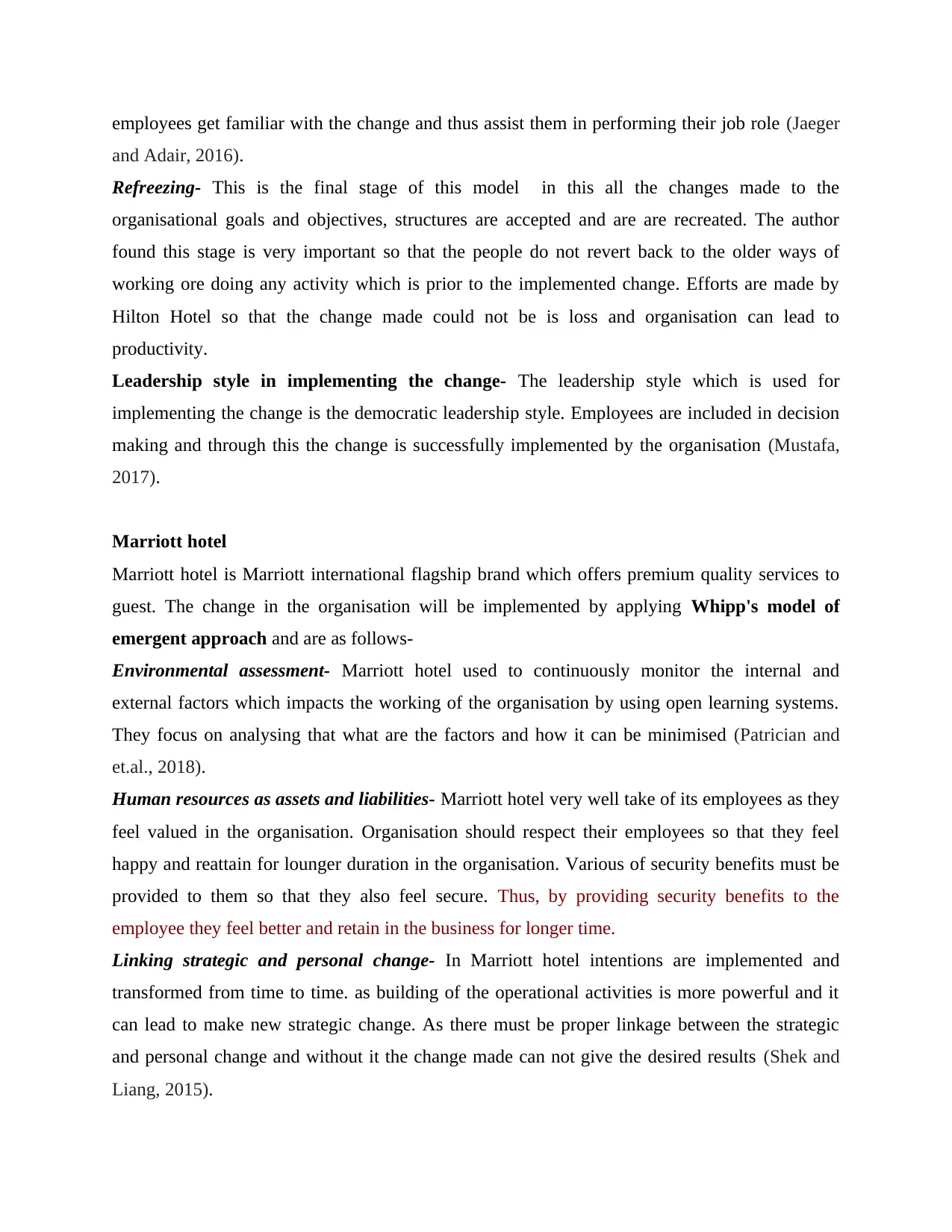
employees get familiar with the change and thus assist them in performing their job role (Jaeger
and Adair, 2016).
Refreezing- This is the final stage of this model in this all the changes made to the
organisational goals and objectives, structures are accepted and are are recreated. The author
found this stage is very important so that the people do not revert back to the older ways of
working ore doing any activity which is prior to the implemented change. Efforts are made by
Hilton Hotel so that the change made could not be is loss and organisation can lead to
productivity.
Leadership style in implementing the change- The leadership style which is used for
implementing the change is the democratic leadership style. Employees are included in decision
making and through this the change is successfully implemented by the organisation (Mustafa,
2017).
Marriott hotel
Marriott hotel is Marriott international flagship brand which offers premium quality services to
guest. The change in the organisation will be implemented by applying Whipp's model of
emergent approach and are as follows-
Environmental assessment- Marriott hotel used to continuously monitor the internal and
external factors which impacts the working of the organisation by using open learning systems.
They focus on analysing that what are the factors and how it can be minimised (Patrician and
et.al., 2018).
Human resources as assets and liabilities- Marriott hotel very well take of its employees as they
feel valued in the organisation. Organisation should respect their employees so that they feel
happy and reattain for lounger duration in the organisation. Various of security benefits must be
provided to them so that they also feel secure. Thus, by providing security benefits to the
employee they feel better and retain in the business for longer time.
Linking strategic and personal change- In Marriott hotel intentions are implemented and
transformed from time to time. as building of the operational activities is more powerful and it
can lead to make new strategic change. As there must be proper linkage between the strategic
and personal change and without it the change made can not give the desired results (Shek and
Liang, 2015).
and Adair, 2016).
Refreezing- This is the final stage of this model in this all the changes made to the
organisational goals and objectives, structures are accepted and are are recreated. The author
found this stage is very important so that the people do not revert back to the older ways of
working ore doing any activity which is prior to the implemented change. Efforts are made by
Hilton Hotel so that the change made could not be is loss and organisation can lead to
productivity.
Leadership style in implementing the change- The leadership style which is used for
implementing the change is the democratic leadership style. Employees are included in decision
making and through this the change is successfully implemented by the organisation (Mustafa,
2017).
Marriott hotel
Marriott hotel is Marriott international flagship brand which offers premium quality services to
guest. The change in the organisation will be implemented by applying Whipp's model of
emergent approach and are as follows-
Environmental assessment- Marriott hotel used to continuously monitor the internal and
external factors which impacts the working of the organisation by using open learning systems.
They focus on analysing that what are the factors and how it can be minimised (Patrician and
et.al., 2018).
Human resources as assets and liabilities- Marriott hotel very well take of its employees as they
feel valued in the organisation. Organisation should respect their employees so that they feel
happy and reattain for lounger duration in the organisation. Various of security benefits must be
provided to them so that they also feel secure. Thus, by providing security benefits to the
employee they feel better and retain in the business for longer time.
Linking strategic and personal change- In Marriott hotel intentions are implemented and
transformed from time to time. as building of the operational activities is more powerful and it
can lead to make new strategic change. As there must be proper linkage between the strategic
and personal change and without it the change made can not give the desired results (Shek and
Liang, 2015).
Paraphrase This Document
Need a fresh take? Get an instant paraphrase of this document with our AI Paraphraser
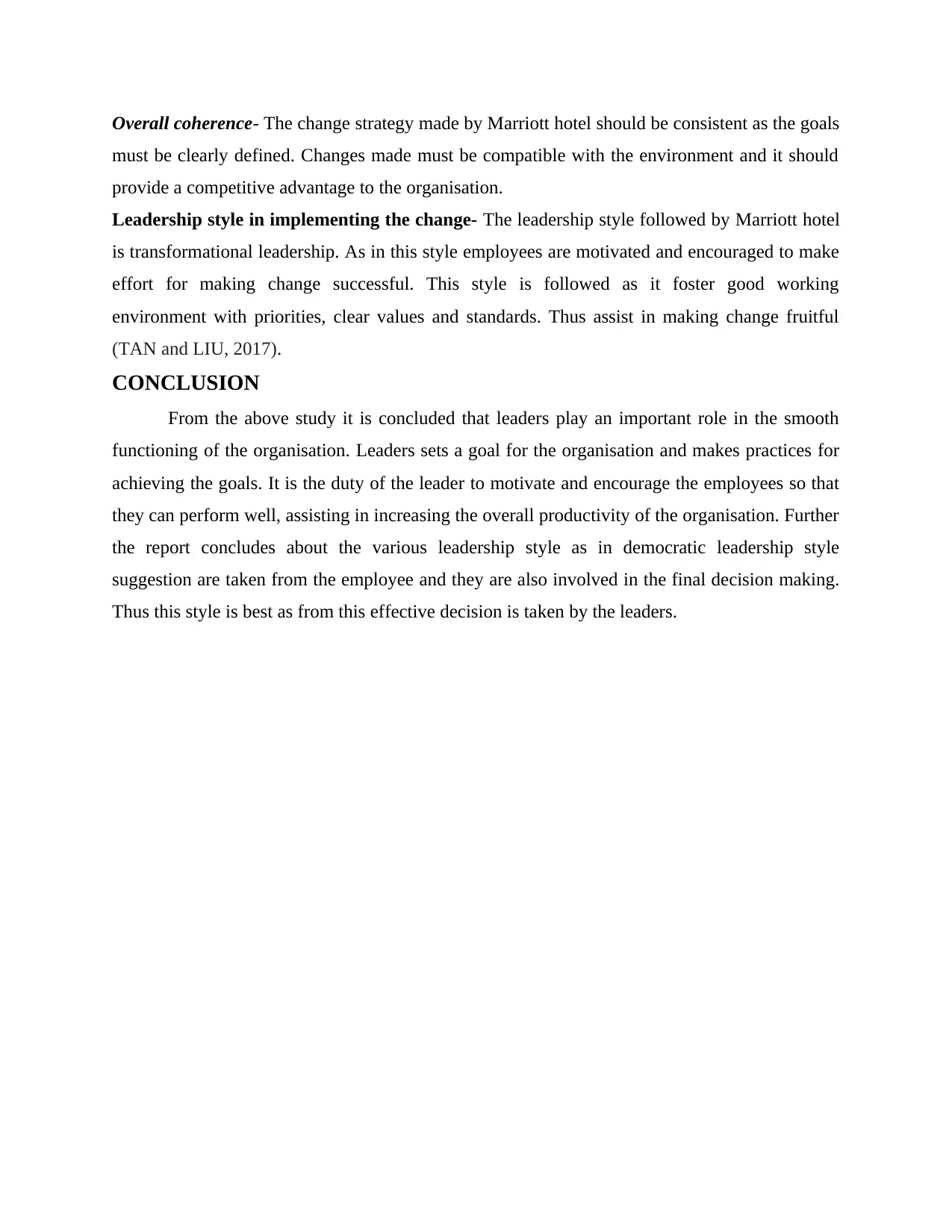
Overall coherence- The change strategy made by Marriott hotel should be consistent as the goals
must be clearly defined. Changes made must be compatible with the environment and it should
provide a competitive advantage to the organisation.
Leadership style in implementing the change- The leadership style followed by Marriott hotel
is transformational leadership. As in this style employees are motivated and encouraged to make
effort for making change successful. This style is followed as it foster good working
environment with priorities, clear values and standards. Thus assist in making change fruitful
(TAN and LIU, 2017).
CONCLUSION
From the above study it is concluded that leaders play an important role in the smooth
functioning of the organisation. Leaders sets a goal for the organisation and makes practices for
achieving the goals. It is the duty of the leader to motivate and encourage the employees so that
they can perform well, assisting in increasing the overall productivity of the organisation. Further
the report concludes about the various leadership style as in democratic leadership style
suggestion are taken from the employee and they are also involved in the final decision making.
Thus this style is best as from this effective decision is taken by the leaders.
must be clearly defined. Changes made must be compatible with the environment and it should
provide a competitive advantage to the organisation.
Leadership style in implementing the change- The leadership style followed by Marriott hotel
is transformational leadership. As in this style employees are motivated and encouraged to make
effort for making change successful. This style is followed as it foster good working
environment with priorities, clear values and standards. Thus assist in making change fruitful
(TAN and LIU, 2017).
CONCLUSION
From the above study it is concluded that leaders play an important role in the smooth
functioning of the organisation. Leaders sets a goal for the organisation and makes practices for
achieving the goals. It is the duty of the leader to motivate and encourage the employees so that
they can perform well, assisting in increasing the overall productivity of the organisation. Further
the report concludes about the various leadership style as in democratic leadership style
suggestion are taken from the employee and they are also involved in the final decision making.
Thus this style is best as from this effective decision is taken by the leaders.
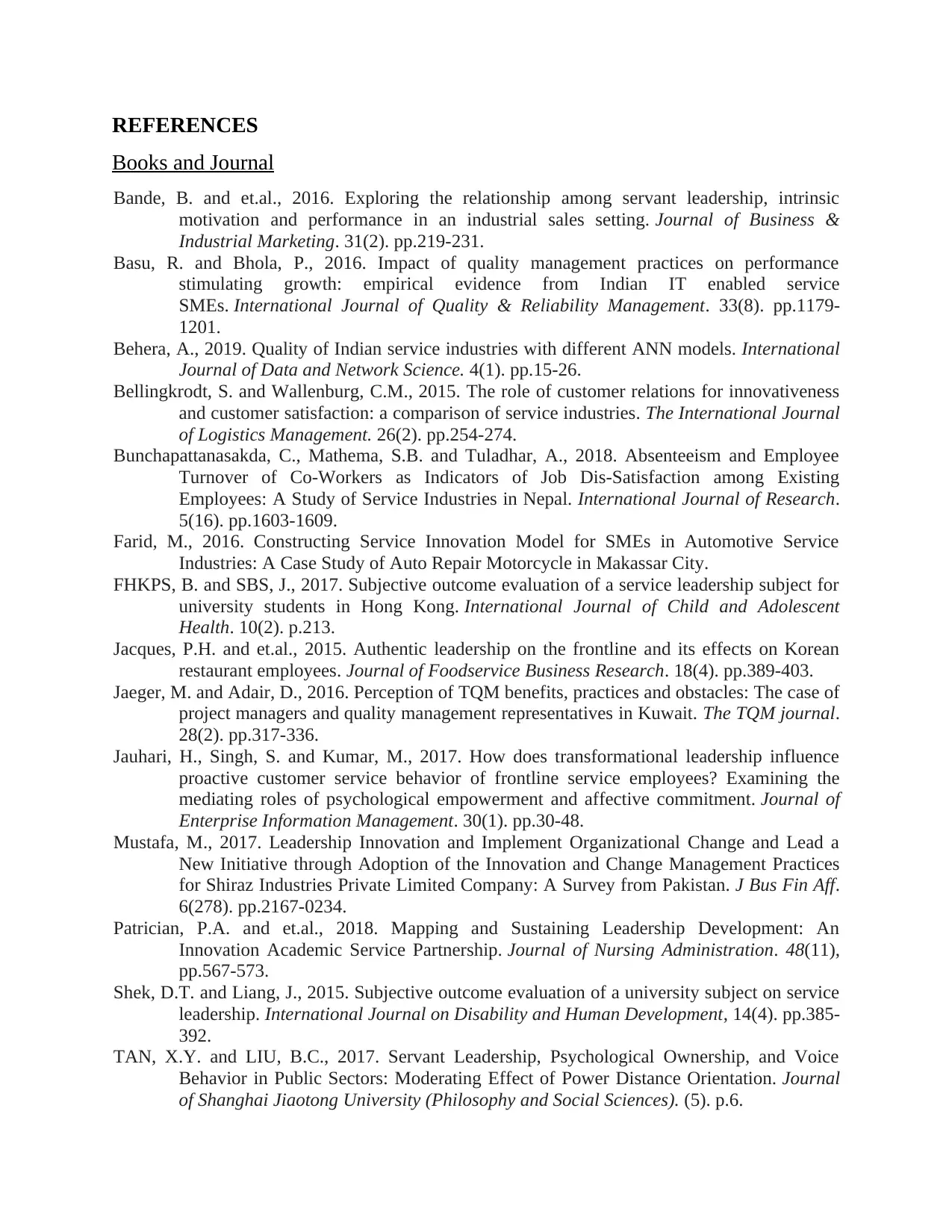
REFERENCES
Books and Journal
Bande, B. and et.al., 2016. Exploring the relationship among servant leadership, intrinsic
motivation and performance in an industrial sales setting. Journal of Business &
Industrial Marketing. 31(2). pp.219-231.
Basu, R. and Bhola, P., 2016. Impact of quality management practices on performance
stimulating growth: empirical evidence from Indian IT enabled service
SMEs. International Journal of Quality & Reliability Management. 33(8). pp.1179-
1201.
Behera, A., 2019. Quality of Indian service industries with different ANN models. International
Journal of Data and Network Science. 4(1). pp.15-26.
Bellingkrodt, S. and Wallenburg, C.M., 2015. The role of customer relations for innovativeness
and customer satisfaction: a comparison of service industries. The International Journal
of Logistics Management. 26(2). pp.254-274.
Bunchapattanasakda, C., Mathema, S.B. and Tuladhar, A., 2018. Absenteeism and Employee
Turnover of Co-Workers as Indicators of Job Dis-Satisfaction among Existing
Employees: A Study of Service Industries in Nepal. International Journal of Research.
5(16). pp.1603-1609.
Farid, M., 2016. Constructing Service Innovation Model for SMEs in Automotive Service
Industries: A Case Study of Auto Repair Motorcycle in Makassar City.
FHKPS, B. and SBS, J., 2017. Subjective outcome evaluation of a service leadership subject for
university students in Hong Kong. International Journal of Child and Adolescent
Health. 10(2). p.213.
Jacques, P.H. and et.al., 2015. Authentic leadership on the frontline and its effects on Korean
restaurant employees. Journal of Foodservice Business Research. 18(4). pp.389-403.
Jaeger, M. and Adair, D., 2016. Perception of TQM benefits, practices and obstacles: The case of
project managers and quality management representatives in Kuwait. The TQM journal.
28(2). pp.317-336.
Jauhari, H., Singh, S. and Kumar, M., 2017. How does transformational leadership influence
proactive customer service behavior of frontline service employees? Examining the
mediating roles of psychological empowerment and affective commitment. Journal of
Enterprise Information Management. 30(1). pp.30-48.
Mustafa, M., 2017. Leadership Innovation and Implement Organizational Change and Lead a
New Initiative through Adoption of the Innovation and Change Management Practices
for Shiraz Industries Private Limited Company: A Survey from Pakistan. J Bus Fin Aff.
6(278). pp.2167-0234.
Patrician, P.A. and et.al., 2018. Mapping and Sustaining Leadership Development: An
Innovation Academic Service Partnership. Journal of Nursing Administration. 48(11),
pp.567-573.
Shek, D.T. and Liang, J., 2015. Subjective outcome evaluation of a university subject on service
leadership. International Journal on Disability and Human Development, 14(4). pp.385-
392.
TAN, X.Y. and LIU, B.C., 2017. Servant Leadership, Psychological Ownership, and Voice
Behavior in Public Sectors: Moderating Effect of Power Distance Orientation. Journal
of Shanghai Jiaotong University (Philosophy and Social Sciences). (5). p.6.
Books and Journal
Bande, B. and et.al., 2016. Exploring the relationship among servant leadership, intrinsic
motivation and performance in an industrial sales setting. Journal of Business &
Industrial Marketing. 31(2). pp.219-231.
Basu, R. and Bhola, P., 2016. Impact of quality management practices on performance
stimulating growth: empirical evidence from Indian IT enabled service
SMEs. International Journal of Quality & Reliability Management. 33(8). pp.1179-
1201.
Behera, A., 2019. Quality of Indian service industries with different ANN models. International
Journal of Data and Network Science. 4(1). pp.15-26.
Bellingkrodt, S. and Wallenburg, C.M., 2015. The role of customer relations for innovativeness
and customer satisfaction: a comparison of service industries. The International Journal
of Logistics Management. 26(2). pp.254-274.
Bunchapattanasakda, C., Mathema, S.B. and Tuladhar, A., 2018. Absenteeism and Employee
Turnover of Co-Workers as Indicators of Job Dis-Satisfaction among Existing
Employees: A Study of Service Industries in Nepal. International Journal of Research.
5(16). pp.1603-1609.
Farid, M., 2016. Constructing Service Innovation Model for SMEs in Automotive Service
Industries: A Case Study of Auto Repair Motorcycle in Makassar City.
FHKPS, B. and SBS, J., 2017. Subjective outcome evaluation of a service leadership subject for
university students in Hong Kong. International Journal of Child and Adolescent
Health. 10(2). p.213.
Jacques, P.H. and et.al., 2015. Authentic leadership on the frontline and its effects on Korean
restaurant employees. Journal of Foodservice Business Research. 18(4). pp.389-403.
Jaeger, M. and Adair, D., 2016. Perception of TQM benefits, practices and obstacles: The case of
project managers and quality management representatives in Kuwait. The TQM journal.
28(2). pp.317-336.
Jauhari, H., Singh, S. and Kumar, M., 2017. How does transformational leadership influence
proactive customer service behavior of frontline service employees? Examining the
mediating roles of psychological empowerment and affective commitment. Journal of
Enterprise Information Management. 30(1). pp.30-48.
Mustafa, M., 2017. Leadership Innovation and Implement Organizational Change and Lead a
New Initiative through Adoption of the Innovation and Change Management Practices
for Shiraz Industries Private Limited Company: A Survey from Pakistan. J Bus Fin Aff.
6(278). pp.2167-0234.
Patrician, P.A. and et.al., 2018. Mapping and Sustaining Leadership Development: An
Innovation Academic Service Partnership. Journal of Nursing Administration. 48(11),
pp.567-573.
Shek, D.T. and Liang, J., 2015. Subjective outcome evaluation of a university subject on service
leadership. International Journal on Disability and Human Development, 14(4). pp.385-
392.
TAN, X.Y. and LIU, B.C., 2017. Servant Leadership, Psychological Ownership, and Voice
Behavior in Public Sectors: Moderating Effect of Power Distance Orientation. Journal
of Shanghai Jiaotong University (Philosophy and Social Sciences). (5). p.6.
⊘ This is a preview!⊘
Do you want full access?
Subscribe today to unlock all pages.

Trusted by 1+ million students worldwide
1 out of 13
Related Documents
Your All-in-One AI-Powered Toolkit for Academic Success.
+13062052269
info@desklib.com
Available 24*7 on WhatsApp / Email
![[object Object]](/_next/static/media/star-bottom.7253800d.svg)
Unlock your academic potential
Copyright © 2020–2026 A2Z Services. All Rights Reserved. Developed and managed by ZUCOL.





